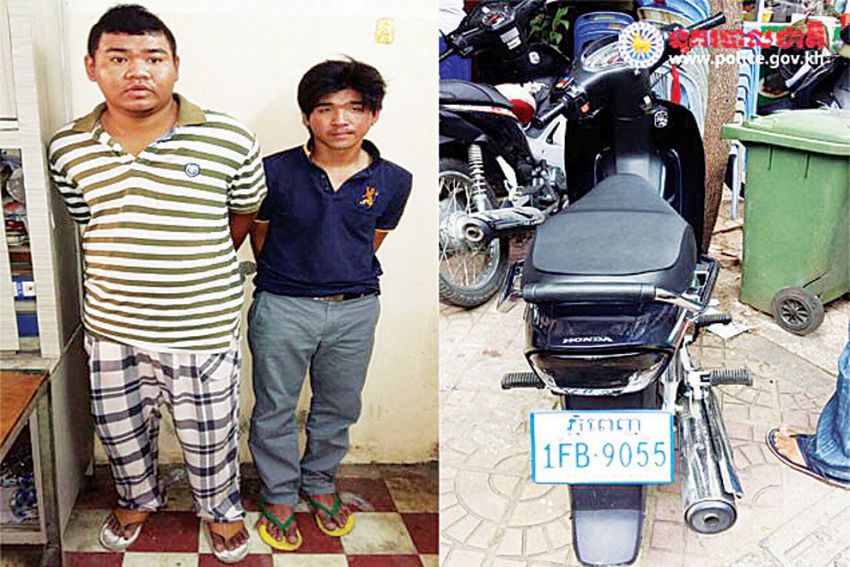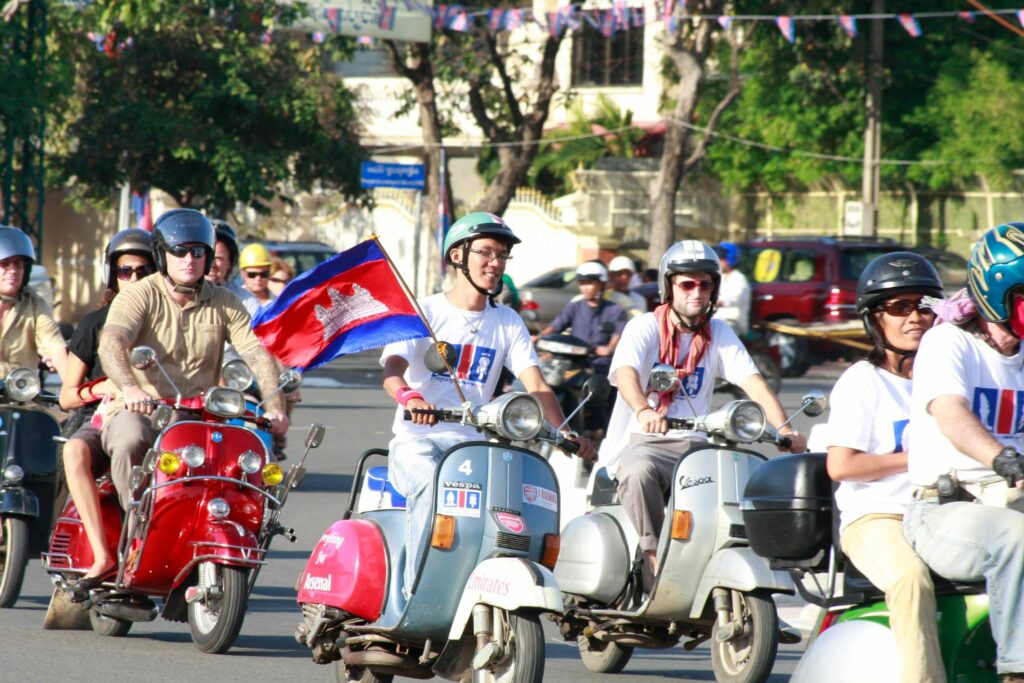Unofficial Translation from The Phnom Penh Post’s Khmer edition
TUESDAY, 1 SEPTEMBER 2015,
TONG SOPRACH
យុវជនទំនើងនៅតែបង្កគ្រោះថ្នាក់ដល់អាយុជីវិតដោយសារឆក់កាបូប

From the period of the change from socialism to capitalism in 1990, people have discovered new ways to modernize their life, to live a deluxe life filled with luxuries and joys although it means exploitation, corruption, or theft and robbery. Especially, young people who generally love having more and more to spend and enjoy their lives but have no job or do not want to work, they are likely to be involved in crimes and offenses, such as stealing or snatching phones, bags, and necklaces, the quickest and easiest means to get money to fulfill their daily desires.
Snatching happens every day in towns, especially various places along the streets in Phnom Penh, causing fear for everyone in the city. They complain that they no longer dare to travel anywhere with valuable things. In general, those snatchers trace their targets from the starting points. Their main targets are those people with jewels, handbags, mobile phones, cameras and other modern devices who just take part in or left the party, wedding, or other ceremonies, and foreigners.
The losses of their things, of course, are upsetting for the victims, but apart from that, they could face many other dangers such as torn or bleeding ears which result from their earing snatched and the head damage occurring when the victims fall from their vehicles after their struggle with the snatchers trying to take their handbags, which could lead to immediate death.
For example, in the previous week, a female year-5 medical student was killed in the early morning when her head hit the ground after a couple of gangsters on a motorbike trying to snatch her bag, causing her to fall from her motorbike. That was not the first death caused the snatchers; many died the same way. Yet, the police have not been able to deal with that effectively. So what are they waiting for?
Meanwhile, the police officers in Preah Sihanouk province are sending two young men, charged with snatching bag, to the court. By the way, in the previous, sometime unbelievable that one of snatchers, who was a college student, confessed at the police station in Sangkat Sras Chork, Daun Penh Destrict, after they were caught by the local people. The questions are “How could young men turn into snatcher? Are they aware of the possible danger they could cause for either themselves or their victim targets? How are they related to the police?”
The answers to those questions could be found in the research report on the behaviors and experience of gangsters in violence, rape, drug and theft (GAD/C, 2003). I, myself, participated in the research and interviewed the youth gangs who used to be involved in those offenses. A key question appeared then: what are the sources of fund you and your team get from for activity?
The answer was gotten from the interview of the youngsters were similar. They started by stealing money from their parents (around 400-500 USD). Then, they would mortgage or sell their things such as motorbikes, jewels, and mobile phones.
When they ran out of things to sell or mortgage, they started stealing and snatching jewel, bags, mobile phones, and computers. The money from those evil deeds would be used on parties, night club, prostitution or Bauk (gang rape), drugs, and gambling. The ones who were professional or so-called experts (a bad title, I guess) assured that they would just snatch the things they want and let nothing happen to the owners. They mocked “unskilled snatcher” for ripping the necklaces or for causing the owners to fall or die in traffic.
However, they would never forget to give some money at least 50 USD to the police officers stationed in the place in which they do their dirty job. As they claimed, those officers always knew what they were doing. When the snatchers were chased by the police officers, their strategy to escape is just drive as fast as possible to leave those officers’ authorized area.
Through that way, they would be safe, at least for now. Nevertheless, these so-called experts were also aware that they would be badly hurt or dead when they were caught by the people. The anger of the victims and the motor-taxi and Tuk-Tuk drivers whose clients were the victims cause them to beat the snatchers, with whatever they have in hands: sticks, pipes or even mallets.
So far, there have been so many cases of mob-killing due to the people’s lack of confidence in the police and the court. This action, nevertheless, is against the law while the people involved could face prosecution.
That is, what should the government do to prevention the possible death or handicap and to protect the foreign tourists from snatching by the gangster? How can it pull our youth away from this deviance? In fact, our prison is not even big enough to jail all those snatchers. Giving the burden of gangsters and snatchers to the police alone is not a long-term effective measure. The youth-related problems are too big in size and thus require preventive measures rather than instant interventions.
For example, what has the Ministry of Education, Youth and Sport done to deal with these problem? Nearly everywhere in Phnom Penh as well as the other cities and provinces, you will find bars, night clubs, KTV and casino around youths and schools. Furthermore, there are transactions of drug among young people, happening anywhere in the country.
How about the National Youth Council? Has it done anything such as recreational and sport site and education center for young people in respond to National Youth Development Policy? To what extent has it dealt with youth’s unemployment effectively? Based on the research report of the Youth Coalition for Unity and Development (YCUD, 2015) “49 percent of Khmer youths raised unemployment as their main concern.”
The problems mentioned above are the main factors which cause the youth to become involved in such crimes and deviances. The police should do the research and the investigation about the current root of youth-related problems, which have bad negative impacts on the society and tourism rather than arrest the offenders just to be released and return to their dirty jobs. Sadly, some youth associations/organizations/federations/unions have not been participated in solving these problems but exploit them for political advantages.
Tong Soprach is a social-affairs columnist for the Post’s Khmer edition.
Comments: [email protected]
